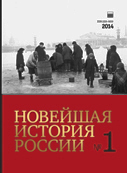Репрессии в Военно-морском инженерном училище имени Ф. Э. Дзержинского в 1930-е гг.
Repressions at the F. E. Dzerzhinsky Naval Engineering School in 1930s
Author(s): S. E. Lazarev, S. S. BliznichenkoSubject(s): History
Published by: Издательство Исторического факультета СПбГУ
Keywords: “Great Terror”; the Navy; the Naval Engineering School of the F. E. Dzerzhinsky; the People’s Commissariat of Internal Affairs; political repression; the teaching staff
Summary/Abstract: The article is devoted to the history of the Naval Engineering Institute (which in 1927–1998 bore the name of F. E. Dzerzhinskii), as well as its prewar graduates, teachers and leaders who were subjected to political repression. Having analyzed the historiography of the issue, the authors contend that the problem of political repression at the Naval Engineering Institute has been addressed only briefly in numerous books and publications and requires clarification. Particularly neglected has been the life and careers of a number of important military leaders and scholars who fell victim to the purges and were subsequently forgotten. For a long time scholarly research on the subject was affected by a lack of access to archival documents. The authors managed to gain access to the documents of four state archives — the Archive of the Military Collegium of the Russian Federation’s Supreme Court, the Archive of the Main Military Prosecutor's Office of the Russian Federation, the Archive of the St. Petersburg and Leningrad Regional Administration of the Federal Security Service, the Russian State Archive of the Navy Fleet, and two local archives — the Archive of the F. E. Dzerzhinskii Naval Engineering Institute and the Tver State United Museum. The majority of these archival materials are introduced into scholarly circulation for the first time. Specific sources help illuminate the training of officers and naval engineering personnel for the navy. In addition to providing a brief essay about the history of the institute, the authors investigate the fate of such naval figures as A. I. Berg, V. L. Brzezinskii, G. N. Borovikov, R. R. Grundman, F. K. Rashevitch, and V. P. Ulanovskii. They come to the conclusion that the political repression against the educational establishment led to a breakdown in the training of skilled military personnel, who could have done much more than they did in the Great Patriotic War. The crude interference of the administrative mechanisms of state control into the creative process prevented the creation of a genuinely innovative atmosphere, led to the stagnation of scientific thought, and, hence, to a loss of competitiveness in regard to opposing forces in any future war.
Journal: Новейшая история России
- Issue Year: 4/2014
- Issue No: 09
- Page Range: 124-139
- Page Count: 16
- Language: Russian

